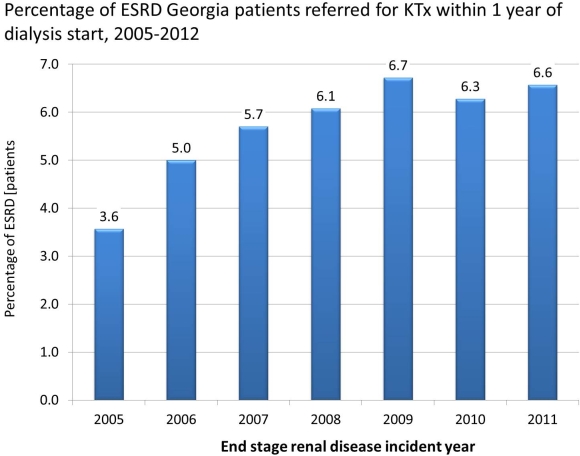Referral for Kidney Transplantation in Georgia: Data from the RaDIANT Community Study
1Emory University, Atlanta
2Southeastern Kidney Council, Raleigh
3Piedmont Hospital, Atlanta
4Georgia Regents University, Augusta, GA.
Meeting: 2015 American Transplant Congress
Abstract number: 262
Keywords: Kidney, Kidney transplantation
Session Information
Session Name: Concurrent Session: Disparities in Healthcare Access
Session Type: Concurrent Session
Date: Monday, May 4, 2015
Session Time: 4:00pm-5:30pm
 Presentation Time: 4:00pm-4:12pm
Presentation Time: 4:00pm-4:12pm
Location: Room 115-C
Purpose
The rate of kidney transplantation (KTx) varies significantly across US dialysis facilities. Referral for KTx from dialysis facility providers is the first key step in accessing a KTx, but the proportion of dialysis patients referred is unknown since referral is not measured in national surveillance data.
Methods
We utilized a cohort of 26,771 incident adult end stage renal disease (ESRD) patients referred for KTx in Georgia (GA) from the Reducing Disparities in Access to kidNey Transplantation (RaDIANT) Community Study who were not preemptively waitlisted, linked with United States Renal Data System data (1/05-9/12). One-year cumulative incidence of referral was defined as first referral within 1 year of dialysis start. Adjusted logistic regression examined the patient-level factors associated with KTx referral within 1 year.
Results
Among 26,771 incident ESRD patients in GA from January 2005-September 2012, the mean age was 60 years and 59.0% were African American. Over the entire study period, 31.6% of ESRD patients were referred for KTx within a median of 2.0 years (IQR: 1.0- 3.8). The average 1-year cumulative incidence of referral was 5.7%, and KTx referral generally increased over the study period [Figure 1]. Multivariable-adjusted logistic regression showed African Americans were 37% (OR=0.63 95% CI 0.55-0.72) less likely than whites to be referred within the first year of ESRD. Dialysis patients with heart disease (OR=0.62; 95% CI 0.54, 0.72) or who were female (OR=0.88; 95% CI 0.80, 1.0) were also less likely to be referred for KTx within their first year of dialysis.
Conclusion
This is the first study to our knowledge to collect KTx referral among all GA patients. We found that fewer than 6% were referred within a year of dialysis start, and African American patients were nearly 40% less likely than their white counterparts to be referred within a year. Interventions are needed to improve KTx referral in GA, particularly among African Americans.
To cite this abstract in AMA style:
Pastan S, Gander J, Plantinga L, Sauls L, Gibney E, Mulloy L, Krisher J, Patzer R. Referral for Kidney Transplantation in Georgia: Data from the RaDIANT Community Study [abstract]. Am J Transplant. 2015; 15 (suppl 3). https://atcmeetingabstracts.com/abstract/referral-for-kidney-transplantation-in-georgia-data-from-the-radiant-community-study/. Accessed March 3, 2026.« Back to 2015 American Transplant Congress
